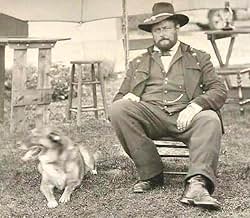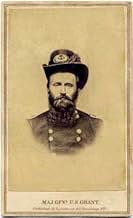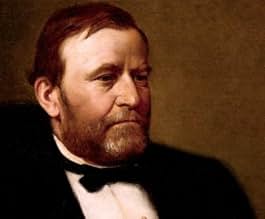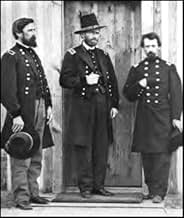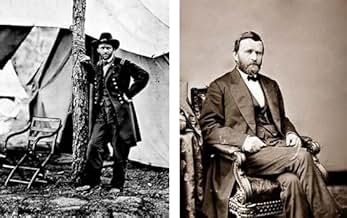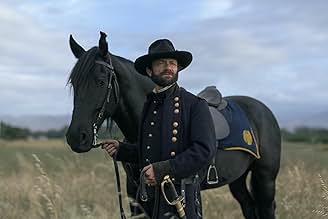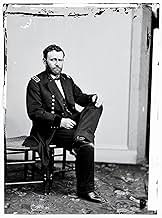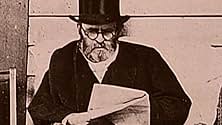IMDb रेटिंग
8.4/10
2.5 हज़ार
आपकी रेटिंग
अपनी भाषा में प्लॉट जोड़ेंThe documentary-series examines Ulysses S. Grant's life story using his perspective and experiences to explore a turbulent time in history: the Civil War and Reconstruction.The documentary-series examines Ulysses S. Grant's life story using his perspective and experiences to explore a turbulent time in history: the Civil War and Reconstruction.The documentary-series examines Ulysses S. Grant's life story using his perspective and experiences to explore a turbulent time in history: the Civil War and Reconstruction.
एपिसोड ब्राउज़ करें
फ़ीचर्ड समीक्षाएं
This is what the History Channel needs more of. These deep dives into small but important figures and parts of history. This is also an excellent part of history that is not overly covered.
Released in 2020, "Grant" is a three-part miniseries based on historian Ron Chernow's 2017 book of the same name. Without commercials, this is a 4-hour film that's part dramatic reenactment featuring Justin Salinger in the lead role and part documentary with a diverse cast of erudite and interesting commentators.
Ulysses S. Grant has been descibed as "an inspired commander, an adequate president, a dull companion and a roaring drunk." I take issue with that last description. Grant might've had an issue with alcohol, but that doesn't make him a "roaring drunk." I know real-life drunkards and they waste their lives sitting around looking for their next drink, accomplishing very little. Drunks don't lead the biggest military force on Earth and win battle-after-battle, as well as the great war itself. Nor are they able to lead a country the size of the USA for eight years and have a successful marriage & family that overcome great challenges over & over.
This might be my favorite Civil War movie of all time, as good or better than the best you can cite, like "Ride with the Devil" (1999), "Glory" (1989), "Cold Mountain" (2003), "The Horse Soldiers" (1959) and "Gods and Generals" (2002). "Grant" is the best cinematic source to understand the big picture of The Civil War, especially as far as the Union's strategy to victory. For instance, what was the purpose of the Battle of Shiloh? If it was a Union victory, why did reporters lambaste Grant as an incompetent drunk and why was he demoted? After crossing the Mississippi, why did Grant go east to fight two battles and capture Jackson, Mississippi, BEFORE going to Vicksburg? What was the strategic value of the Battle of the Wilderness? Petersburg and Cold Harbor?
The reanactments are realistic with utterly savage battle scenes. This is what it was like, folks. War is hell. Thankfully, the film doesn't end with Lee's surrender at Appomattax, but goes on to address Grant's final 22 years of life as President during Reconstruction, his wide travels, tragedies and finishing his memoir 3 days before passing away.
GRADE: A
Ulysses S. Grant has been descibed as "an inspired commander, an adequate president, a dull companion and a roaring drunk." I take issue with that last description. Grant might've had an issue with alcohol, but that doesn't make him a "roaring drunk." I know real-life drunkards and they waste their lives sitting around looking for their next drink, accomplishing very little. Drunks don't lead the biggest military force on Earth and win battle-after-battle, as well as the great war itself. Nor are they able to lead a country the size of the USA for eight years and have a successful marriage & family that overcome great challenges over & over.
This might be my favorite Civil War movie of all time, as good or better than the best you can cite, like "Ride with the Devil" (1999), "Glory" (1989), "Cold Mountain" (2003), "The Horse Soldiers" (1959) and "Gods and Generals" (2002). "Grant" is the best cinematic source to understand the big picture of The Civil War, especially as far as the Union's strategy to victory. For instance, what was the purpose of the Battle of Shiloh? If it was a Union victory, why did reporters lambaste Grant as an incompetent drunk and why was he demoted? After crossing the Mississippi, why did Grant go east to fight two battles and capture Jackson, Mississippi, BEFORE going to Vicksburg? What was the strategic value of the Battle of the Wilderness? Petersburg and Cold Harbor?
The reanactments are realistic with utterly savage battle scenes. This is what it was like, folks. War is hell. Thankfully, the film doesn't end with Lee's surrender at Appomattax, but goes on to address Grant's final 22 years of life as President during Reconstruction, his wide travels, tragedies and finishing his memoir 3 days before passing away.
GRADE: A
I found the first night interesting enough to make me download Grant's autobiography. It covers a lot of ground but like many shows can't get real deep in a few hours (especially with commercials). Use your DVR to watch uninterrupted. I'm happy for these historical biographical shows- I doubt anyone is getting any of this in school much anymore, especially in any depth.
I felt a need to review Grant because so many reviews focused on the HULU presentation, with apparently many commercials, and not actually on the series. That's like reviewing a car and complaining about the number of traffic lights on the road test.
This is based on seeing Grant on the History Channel.
The series is excellent, on a par with Ken Burns' Civil War, but with about 50% reenactment plus interviews and old photos and illustrations.
The reenactment appears to be educated conjecture for the most part, with a few actual quotations and without sensationalism. The acting is solid, but the only moderate depth of character is Grant himself, as well-done as possible when limited to brief vignettes.
I'd recommend this to anyone who wants an overview of Grant's life. TV is great for giving you a few inches below the surface. For more depth, read a book.
A slightly homorous aside: among the historians interviewed, there are a number who have the appearance of Southern grandees, with closely manicured mustaches and goatees.
(Based on episode 1)
The Union won.
The series is excellent, on a par with Ken Burns' Civil War, but with about 50% reenactment plus interviews and old photos and illustrations.
The reenactment appears to be educated conjecture for the most part, with a few actual quotations and without sensationalism. The acting is solid, but the only moderate depth of character is Grant himself, as well-done as possible when limited to brief vignettes.
I'd recommend this to anyone who wants an overview of Grant's life. TV is great for giving you a few inches below the surface. For more depth, read a book.
A slightly homorous aside: among the historians interviewed, there are a number who have the appearance of Southern grandees, with closely manicured mustaches and goatees.
(Based on episode 1)
The Union won.
This documentary was always going to stand or fall on the portrayal of Grant and credit must be given to the Casting Directors Suzanne Smith & Bonnie Rodini for casting the criminally underused JUSTIN SALINGER. While Salinger might not be the perfect lookalike, it was clearly far more important to cast an actor capable of playing the many subtle nuances and complexities of the man and Salinger does a superb job here with his performance of Grant and I felt he was closer to the man than anyone to have portrayed him previously. While praising the actors, I am also going to single out the young man who played the Union private in the first episodes excellent opening sequence, ARTHUR FALKO - Again, extremely good casting, it was as if this one individual was wearing the entire history of the war on his face in those opening moments. Anticipation, fear, dread and later bravery and valour. I expect to be seeing a great deal more of him on our screens in future.
The series format jumps from documentary commentary and anecdotes from various historians and it was nice to see dialogue offered from both a male and female black historian on the man and the conflict in which he fought. This was a war over which the issue of slavery was key, so it felt quite right too and made this aspect of the series, far more interesting to watch than just having the usual older generation historian faces chipping in their valulable, but rather well worn comments.
The most engrossing segments of the show however are the dramatic segments and it was these and Salingers performance that kept me engaged in the show.
While I would have perferred to see a straight up drama mini series about the man without any of the historical commentary, this never the less is an extremely well made piece covering the life and motivations of one of the most equally loved and hated Commanders of the Civil War. I found it both educational and enligtening. Despite the more restrictive budget for a peroid piece the drama scenes are extremely well handled and critism by armchair historians about drill and uniforms are poorly founded. The uniforms are authentic, the drill of the early Union army appropriately poor in the early episodes, as was the army's state at this time. People need to remember, just because you read something in a book, doesn't make it a verbatim mode of action for every individual. War is complex, conscripted soldiers are not veterans, nor at first a professional army. It would be some time before the Union became one.
It would be great to see more in the series in a similar fashion. This was very enjoyable and I hope will engage a younger audience in the subject. That is the most important thing of all. The youth are, after all, the best hope for keeping history alive in the future.
The series format jumps from documentary commentary and anecdotes from various historians and it was nice to see dialogue offered from both a male and female black historian on the man and the conflict in which he fought. This was a war over which the issue of slavery was key, so it felt quite right too and made this aspect of the series, far more interesting to watch than just having the usual older generation historian faces chipping in their valulable, but rather well worn comments.
The most engrossing segments of the show however are the dramatic segments and it was these and Salingers performance that kept me engaged in the show.
While I would have perferred to see a straight up drama mini series about the man without any of the historical commentary, this never the less is an extremely well made piece covering the life and motivations of one of the most equally loved and hated Commanders of the Civil War. I found it both educational and enligtening. Despite the more restrictive budget for a peroid piece the drama scenes are extremely well handled and critism by armchair historians about drill and uniforms are poorly founded. The uniforms are authentic, the drill of the early Union army appropriately poor in the early episodes, as was the army's state at this time. People need to remember, just because you read something in a book, doesn't make it a verbatim mode of action for every individual. War is complex, conscripted soldiers are not veterans, nor at first a professional army. It would be some time before the Union became one.
It would be great to see more in the series in a similar fashion. This was very enjoyable and I hope will engage a younger audience in the subject. That is the most important thing of all. The youth are, after all, the best hope for keeping history alive in the future.
क्या आपको पता है
टॉप पसंद
रेटिंग देने के लिए साइन-इन करें और वैयक्तिकृत सुझावों के लिए वॉचलिस्ट करें
- How many seasons does Grant have?Alexa द्वारा संचालित
विवरण
इस पेज में योगदान दें
किसी बदलाव का सुझाव दें या अनुपलब्ध कॉन्टेंट जोड़ें



